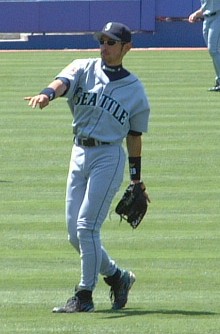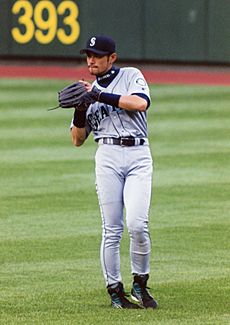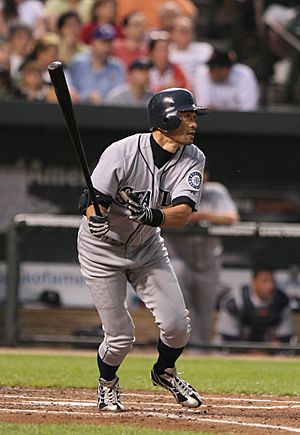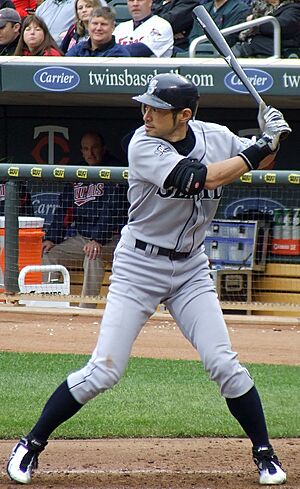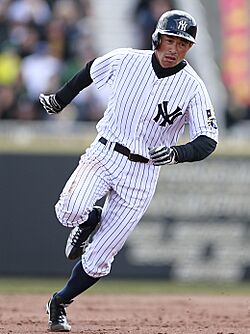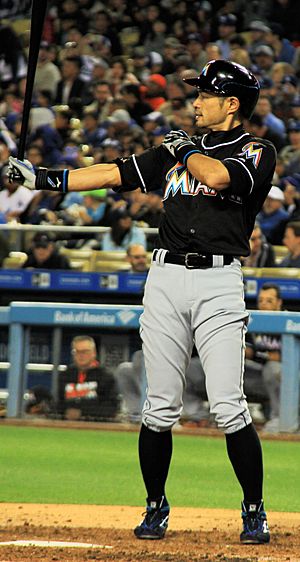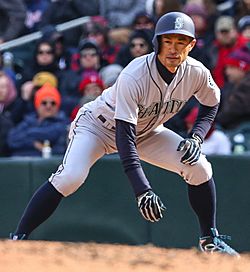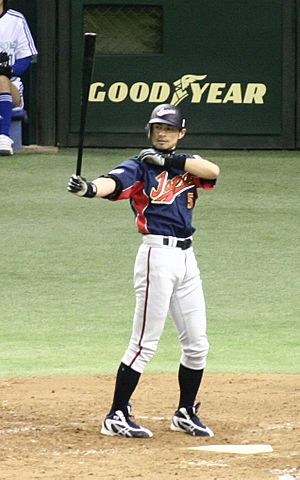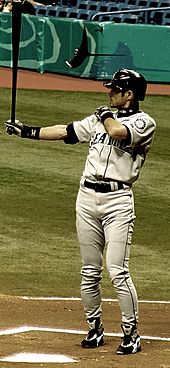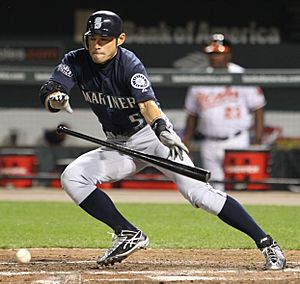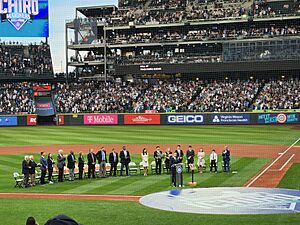Ichiro Suzuki facts for kids
Quick facts for kids Ichiro Suzuki |
|||||||||||||||||
|---|---|---|---|---|---|---|---|---|---|---|---|---|---|---|---|---|---|
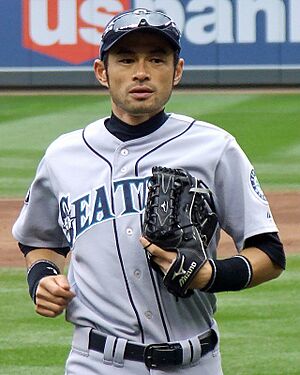
Suzuki with the Seattle Mariners in 2011
|
|||||||||||||||||
| Right fielder | |||||||||||||||||
| Born: 22 October 1973 Nishikasugai-gun, Aichi, Japan |
|||||||||||||||||
|
|||||||||||||||||
| Professional debut | |||||||||||||||||
| NPB: 11 July, 1992, for the Orix BlueWave | |||||||||||||||||
| MLB: 2 April, 2001, for the Seattle Mariners | |||||||||||||||||
| Last appearance | |||||||||||||||||
| NPB: 13 October, 2000, for the Orix BlueWave | |||||||||||||||||
| MLB: 21 March, 2019, for the Seattle Mariners | |||||||||||||||||
| NPB statistics | |||||||||||||||||
| Batting average | .353 | ||||||||||||||||
| Hits | 1,278 | ||||||||||||||||
| Home runs | 118 | ||||||||||||||||
| Runs batted in | 529 | ||||||||||||||||
| Stolen bases | 199 | ||||||||||||||||
| MLB statistics | |||||||||||||||||
| Batting average | .311 | ||||||||||||||||
| Hits | 3,089 | ||||||||||||||||
| Home runs | 117 | ||||||||||||||||
| Runs batted in | 780 | ||||||||||||||||
| Stolen bases | 509 | ||||||||||||||||
| Teams | |||||||||||||||||
|
|||||||||||||||||
| Career highlights and awards | |||||||||||||||||
NPB
MLB
|
|||||||||||||||||
| Induction | 2025 | ||||||||||||||||
| Vote | 99.7% (first ballot) | ||||||||||||||||
|
Medals
|
|||||||||||||||||
Ichiro Suzuki /ˈiːtʃɪroʊ suːˈzuːki/ (鈴木 一朗, Suzuki Ichirō, born 22 October 1973), often called just Ichiro, is a Japanese former professional baseball outfielder. He played for 28 seasons in total. He spent his first nine years with the Orix BlueWave in Japan's top league, Nippon Professional Baseball (NPB). Then, he played 12 years with the Seattle Mariners in Major League Baseball (MLB) in the United States.
After that, Ichiro played for the New York Yankees and Miami Marlins before returning to the Mariners for his final two seasons. He helped the Japanese national team win two World Baseball Classic titles. Many people consider him one of the best contact hitters, leadoff hitters, and defensive outfielders in baseball history.
During his career in both NPB and MLB, Ichiro was chosen for 17 straight All-Star teams and won 17 Gold Glove awards. He also won nine league batting titles and was named his league's Most Valuable Player (MVP) four times. In Japan, he won seven batting titles in a row and three MVP awards. In 2001, he became the first Japanese position player to join an MLB team. That year, he led the American League (AL) in batting average and stolen bases. He also won the AL Rookie of the Year and AL MVP awards.
Ichiro was a ten-time MLB All-Star. He won the 2007 All-Star Game MVP award. He also won a Rawlings Gold Glove Award in each of his first 10 years in MLB. Ichiro holds the MLB record for most hits in a single season with 262. He also had 10 seasons in a row with 200 or more hits, which is the longest streak ever. In 2016, he got his 3,000th hit in MLB, becoming only the 30th player to do so. Overall, he had 4,367 hits in his professional career in Japan and the U.S., more than any other player in top-level baseball history. In 2025, Ichiro was elected to the National Baseball Hall of Fame in his first year of eligibility. He was the first Japanese player to be elected, receiving 99.7% of the votes. That same year, he was also elected to the Japanese Baseball Hall of Fame.
Contents
- Early Life and Baseball Training
- Professional Baseball Career
- International Baseball Career
- Playing Style
- Personality and Influence
- Legacy and Hall of Fame
- Personal Life
- See also
Early Life and Baseball Training
Ichiro Suzuki was born in Nishikasugai-gun, Aichi, Japan. He grew up in Toyoyama, a small town near Nagoya. When he was seven, Ichiro joined his first baseball team. He asked his father, Nobuyuki Suzuki, to help him become a better player.
They started a daily training routine. This included throwing 50 pitches, fielding 50 balls in the infield and 50 in the outfield, and hitting 500 pitches. Some pitches came from a machine, and 250 were thrown by his father.
As a young player, Ichiro had the word "concentration" written on his glove. By age 12, he was serious about becoming a professional baseball player. His training sessions became very tough and less fun. Ichiro later said it felt like the difficult training shown in Star of the Giants, a Japanese manga and anime about a young baseball player's hard journey to success.
When Ichiro joined his high school team, his father told the coach not to praise him. He wanted Ichiro to become mentally strong. Ichiro went to Aikodai Meiden High School, which had a famous baseball program. He mostly played as a pitcher because he had a very strong arm. He also had a great batting average of .505 in high school, with 19 home runs.
He built his strength by doing unusual exercises, like throwing car tires and hitting Wiffle balls with a heavy shovel. These exercises helped his wrists and hips, giving him power and endurance despite his thin body. Even with his amazing high school stats, Ichiro was not picked until the fourth round of the NPB draft in 1991. Many teams thought he was too small at 5 ft 9+1⁄2 in (177 cm) and 124 pounds (56 kg). Years later, Ichiro said he hoped kids would see him as a regular guy who could still achieve great things.
Professional Baseball Career
Playing in Japan (1992–2000)
Ichiro made his professional debut in Japan in 1992 for the Orix BlueWave when he was 18. For his first two seasons, he mostly played in the minor leagues. His manager at the time, Shōzō Doi, didn't like Ichiro's unique batting swing. This swing was called 'pendulum' because his leg moved like a pendulum.
In 1994, a new manager, Akira Ōgi, arrived and played Ichiro every day. Ichiro quickly became a star. He set a Japanese record with 210 hits in one season, the first player to get over 200 hits. His .385 batting average in 1994 was a Pacific League record. He won the first of seven straight batting titles and three MVP awards.
During the 1994 season, he started using "Ichiro" on his uniform instead of his family name, "Suzuki." This was a way to make him stand out, as Suzuki is a very common name in Japan. At first, Ichiro didn't like it, but by the end of the season, "Ichiro" was famous.
In 1995, Ichiro helped the BlueWave win their first Pacific League title in 12 years. He led the league in RBIs and stolen bases, and hit a career-high 25 home runs. The Japanese media started calling him the "Hit Manufacturing Machine." The next year, his team won the Japan Series. After playing against Major League All-Stars in 1996, Ichiro wanted to play in the U.S.
In 2000, Ichiro was allowed to talk with Major League teams. The Seattle Mariners won the right to sign him. He signed a three-year, $14 million contract. In his nine seasons in Japan, Ichiro had 1,278 hits and a .353 batting average. He also won seven Golden Glove Awards.
Joining the Seattle Mariners (2001–2012)
2001: A Rookie Sensation
Ichiro joined the Seattle Mariners in 2001. Many people wondered if he was strong enough for MLB. But he had an amazing first season. In his eighth game, he showed off his powerful throwing arm, throwing out a runner trying to go from first to third base. This play was called "The Throw" by Japanese media.
Ichiro wore number 51, his number in Japan. He had a fantastic 2001 season, setting a rookie record with 242 hits. He also had a .350 batting average and 56 stolen bases. He was the first player since Jackie Robinson in 1949 to lead his league in both batting average and stolen bases. His great fielding in right field led to that area of the stadium being called "Area 51."
Fans from Japan even took special baseball tours to watch him play. Over 150 Japanese reporters covered his games. Ichiro was the first rookie to lead all players in All-Star Game voting. That winter, he won both the AL Most Valuable Player and Rookie of the Year awards. He was only the second player ever to win both in the same season.
The Mariners had a record-tying 116 wins in 2001. Ichiro hit very well in the playoffs, but the Mariners lost to the New York Yankees.
Consistent Success (2002–2008)
In 2002, Ichiro had 208 hits, becoming the first Mariner with two straight 200-hit seasons. He was also the fifth player in MLB history to start his career with two 200-hit seasons. He led All-Star voting for the second year in a row.
In 2003, Ichiro got 212 hits, making him one of only three players to start their career with three 200-hit seasons. He was again elected to the All-Star game and led all players in votes.
Breaking the Single-Season Hit Record (2004)
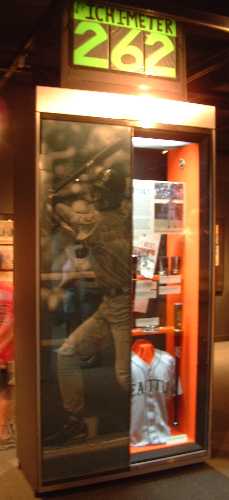
Ichiro had his best hitting season in 2004. He broke George Sisler's 84-year-old record for most hits in a single season. On October 1, he got his 258th hit, breaking the record. He finished the season with an amazing 262 hits, setting new records for both U.S. and Japanese baseball.
From 2001 to 2004, Ichiro had more hits (924) than anyone in history over any four-year period. He later broke his own record with 930 hits from 2004 to 2007.
More Milestones (2005–2008)
In 2005, Ichiro had 206 hits, reaching 200 hits for his fifth straight season. This made him the first player to get 200 hits in each of his first five MLB years. He also reached 1,000 career hits faster than any other MLB player.
In 2006, Ichiro led all of MLB with 224 hits. He also won his sixth Gold Glove Award and was selected for his sixth All-Star Game. He started wearing high baseball pants during the 2006 World Baseball Classic.
In 2007, Ichiro had a 25-game hitting streak, a Mariners record. He also stole 45 bases in a row without being caught, an American League record. On July 10, 2007, he made history by hitting the first-ever inside-the-park home run in an MLB All-Star Game. He was named the All-Star Game MVP. Later that year, he signed a five-year contract extension with the Mariners.
In 2008, Ichiro had 213 hits, his eighth straight 200-hit season. This tied a 107-year-old record. He also broke the Mariners' team record for stolen bases. By July 2008, he became the second-youngest player to reach 3,000 top-level professional hits (combining Japan and U.S.).
Injuries and Records (2009–2011)
Ichiro started 2009 on the disabled list for the first time in his career due to a bleeding ulcer. He returned on April 15 and hit a grand slam, which was his 3,085th professional hit, tying the Japanese record. He broke the record the next night.
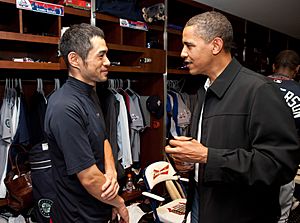
On September 6, 2009, Ichiro got his 2,000th MLB hit. He was the second-fastest player to reach this milestone. On September 13, he got his 200th hit of the season for the ninth year in a row, setting an all-time MLB record. He finished 2009 leading MLB with 225 hits. He also won his second Fielding Bible Award for his great defense.
In 2010, Ichiro played in his tenth MLB season, making him eligible for the Hall of Fame in the future. On September 23, he became the first MLB player to reach 200 hits for 10 straight seasons. He also tied Pete Rose for the most career seasons with 200+ hits. Ichiro played in all 162 games in 2010, his third time doing so. He won his tenth straight Rawlings Gold Glove Award.
In 2011, Ichiro broke the Mariners' all-time career hits record. However, it was his first season in 11 years that he didn't make the All-Star team or get 200 hits.
Final Mariners Season (2012)
On June 19, 2012, Ichiro got his 2,500th MLB hit. He reached this milestone in the fourth-fewest games in major league history.
Ichiro decided he wanted to play for a team that was winning more. He asked the Mariners for a trade.
New York Yankees (2012–2014)
In July 2012, the Mariners traded Ichiro to the New York Yankees. He played his first game as a Yankee against his old team, the Mariners. He agreed to play mostly in left field and bat lower in the lineup. Ichiro hit safely in his first 12 games as a Yankee. He wore number 31 because his usual number 51 was retired by the Yankees.
On July 30, he hit his first home run as a Yankee, which was also his 100th career home run. He played very well for the Yankees, batting .322 in 67 games. In the 2012 playoffs, he hit his first career postseason home run.
In December 2012, Ichiro signed a two-year deal with the Yankees. On August 21, 2013, he got his 4,000th professional career hit (combining Japan and U.S.). He was the seventh player in baseball history to reach this mark.
Miami Marlins (2015–2017)
In 2015, Ichiro signed a one-year contract with the Miami Marlins. He was planned to be a backup outfielder, but he played a lot due to injuries on the team. On August 14, he got his 4,192nd top-level hit, passing Ty Cobb. On August 31, he scored his 2,000th professional run. On the last day of the 2015 season, he even pitched in his first MLB game, allowing one run in one inning.
In 2016, Ichiro stole his 500th career MLB base. On June 15, he recorded his 4,257th career hit, breaking Pete Rose's all-time record for hits in top-tier professional baseball (when combining hits from Japan and MLB). On August 7, Ichiro got his 3,000th hit in MLB, hitting a triple off the wall. He became one of only seven players to have 3,000 hits and 500 stolen bases.
After the 2016 season, the Marlins kept Ichiro for the 2017 season. In 2017, he became the oldest player to start a game in center field since at least 1900. He also became the all-time leader in MLB hits among foreign-born players with 3,054 hits, passing Rod Carew. He set a Marlins' record for most pinch-hits in a season with 27. After the season, the Marlins decided not to keep him for 2018.
Return to the Mariners (2018–2019)
On March 7, 2018, Ichiro signed a one-year contract to return to the Seattle Mariners. At 44 years old, he was the second-oldest active player in baseball. On May 3, the Mariners announced that Ichiro would move to a front office role as a special assistant to the chairman for the rest of the season. He did not play again in 2018.
On March 20, 2019, Ichiro started in right field for the Mariners' opening game in Japan. At 45 years old, he was the second-oldest position player to start on opening day. The next night, March 21, 2019, Ichiro played his final professional game. He went 0-for-4 at the plate. In the eighth inning, he walked off the field to a huge round of applause. Later that day, Ichiro officially announced his retirement.
Ichiro's 19 seasons in MLB, combined with his nine years in Japan, meant he played 28 seasons in top-level baseball. This broke the record for most seasons played by a position player. After retiring, he continued his role as a special assistant to the Mariners' chairman.
International Baseball Career
2006 World Baseball Classic
Ichiro played for the Japan national baseball team in the first 2006 World Baseball Classic in March 2006. Japan won the tournament, beating Cuba 10–6 in the finals. Ichiro had 12 hits, including a home run, seven runs, and four stolen bases in the tournament.
2009 World Baseball Classic
Ichiro struggled for most of the 2009 tournament. However, in the championship game against South Korea, he delivered the game-winning hit. With two outs in the top of the tenth inning, he hit a two-run single that broke a 3–3 tie. Japan won 5–3. Ichiro ended the night with four hits.
Playing Style
Ichiro was known for his unique playing style. He was a "slap" hitter, meaning he focused on getting small hits rather than hitting for power. He was amazing at getting infield hits, which require great technique and speed. He once said he preferred to impress fans with his technique rather than brute strength.
While he was a great hitter, he didn't walk very often. In 2004, when he set the hit record, he only had 49 walks. Ichiro was also known for his excellent defense in right field. He had great range and a strong, accurate throwing arm. He won 10 Gold Glove Awards for his defense.
Ichiro was also interested in pitching. In 1996, he pitched to one batter in a Japanese All-Star game. In 2009, his fastball was clocked at 92 mph during a workout. On the last day of the 2015 season, he pitched in his first MLB game.
Ichiro is the only left-handed hitter in Major League history with a "reverse platoon split." This means he actually hit better against left-handed pitchers than right-handed pitchers.
Personality and Influence
Ichiro was known for his strong work ethic. He would arrive early for games and do special stretching exercises to stay flexible. He used his first name, "Ichiro," on his uniform, a custom he started in Japan.
His success helped open the door for other Japanese players to join Major League Baseball, like Hideki Matsui and Shohei Ohtani. Ichiro's career was followed very closely in Japan. National TV news programs would cover his every at-bat. Special tours were even arranged for Japanese fans to visit the U.S. and watch his games.
Ichiro's agent, Tony Attanasio, said that Ichiro was so famous in Japan that you only needed to write "Ichiro" on an envelope for it to reach him. His popularity helped MLB sign a big broadcasting deal in Japan.
Ichiro appeared in TV commercials in Japan for brands like ENEOS and Mizuno. He was also the basis for a character named "Kyoshiro" in the anime and manga Major.
When he first came to the U.S., Ichiro enjoyed talking with former Negro leagues star Buck O'Neil. After O'Neil passed away, Ichiro sent a large memorial wreath to his funeral. The next year, he visited the Negro Leagues Baseball Museum and made the largest donation ever by an active MLB player.
Ichiro speaks English well and often talked with his teammates in English. However, he used an interpreter for interviews to make sure he was understood perfectly. He also learned Spanish to chat with other players, feeling a connection to other foreign players trying to succeed in the U.S.
Legacy and Hall of Fame
In 2018, a new species of wasp was named Diolcogaster ichiroi after Ichiro Suzuki. The researcher who named it wanted to honor Ichiro as his favorite baseball player.
On August 27, 2022, Ichiro was inducted into the Seattle Mariners Hall of Fame.
On January 16, 2025, Ichiro was elected to the Japanese Baseball Hall of Fame in his first year of eligibility. He received 92.6% of the votes.
Later that month, Ichiro was elected to the National Baseball Hall of Fame in his first year on the ballot. He received 393 out of 394 possible votes, tying Derek Jeter for the second-highest vote percentage ever. He became the first Asian player to be inducted into the Hall of Fame. The Mariners also announced that his uniform number 51 jersey would be officially retired in August 2025.
Personal Life
Ichiro married Yumiko Fukushima, a former TV announcer, on December 3, 1999. They have a pet dog named Ikkyu. They lived in Issaquah, Washington, when he played for the Mariners, and in Miami Beach, Florida, when he played for the Marlins.
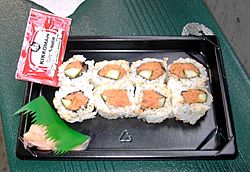
On March 18, 2011, Ichiro donated ¥100 million (about $1.25 million) to the Japanese Red Cross to help with relief efforts after the earthquake and tsunami.
Ichiro's father, Nobuyuki, managed his finances early in his career. However, due to some financial issues, their relationship became difficult. Since then, Ichiro's wife, Yumiko, has handled his finances.
Since 2000, Ichiro's father has run an exhibition room called "I-fain" in Toyoyama, Ichiro's hometown. It displays many items from Ichiro's childhood and baseball career. Ichiro is also the honored chairman of the Ichiro Cup, a six-month-long boys' baseball tournament in Toyoyama. He watches the final game and attends the awards ceremony every year.
|
See also
 In Spanish: Ichiro Suzuki para niños
In Spanish: Ichiro Suzuki para niños
 | Aurelia Browder |
 | Nannie Helen Burroughs |
 | Michelle Alexander |


